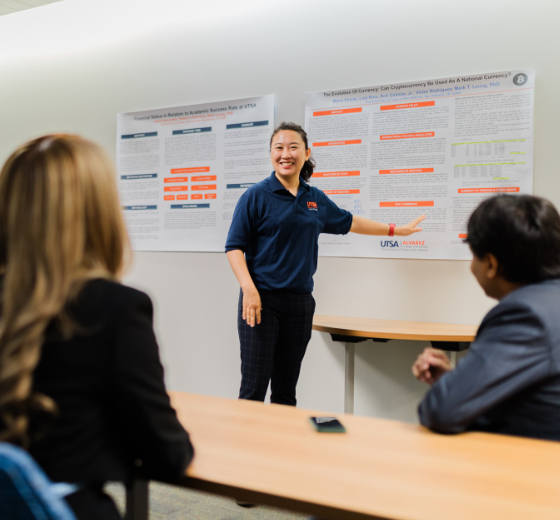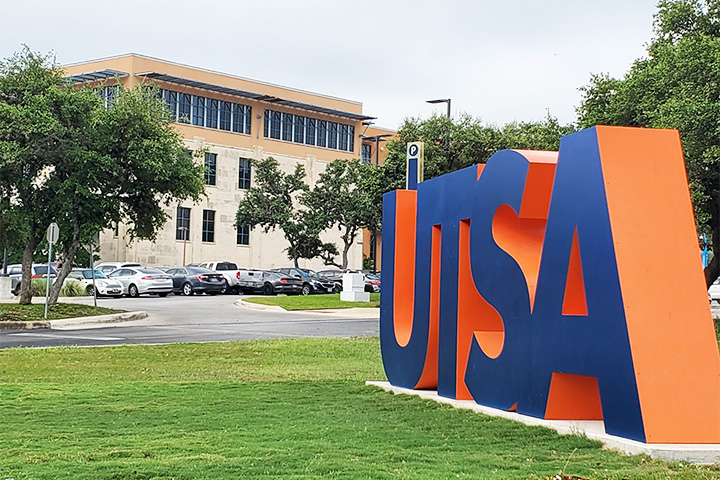Empowering Thinkers, Accelerating Growth
At the Carlos Alvarez College of Business, we are charting an integrated path to establish ourselves as world-class leaders in business education.
Vision
The Carlos Alvarez College of Business will accelerate socioeconomic growth in our community by empowering the next generation of business thinkers and conducting groundbreaking research that ensures their success.
Mission
To equip students with the knowledge, skills and real-world experiences they need to thrive in today’s workforce, while enabling our faculty to turn bold ideas into transformative solutions through high-impact research and instruction.
Our strategic plan is the result of a shared vision, shaped by the dedication and insight of our faculty and staff. Their commitment to research, teaching and service fuels everything we do.
This collaborative foundation strengthens our path forward, positioning the college as a transformative force that drives innovation, opportunity and impact in San Antonio and beyond.
Strategic Milestones
To drive the next five years of growth and impact, we have identified three strategic milestones that will shape the future of the college.
These milestones position us on a clear path to become one of the top three public business schools in Texas and among the top 50 in the nation. They are not just ambitious goals; they reflect our commitment to excellence and align directly with the university's broader vision: becoming a great public research university, serving as a national model for student success and fostering an innovative environment to work, learn and discover.

Including a sustained 95% job placement rate within six months of graduation.

Reach the top 75 in the UT Dallas North America Business School Rankings.

Increase our endowment to $85 million to support our strategic ambitions.
Strategic Roadmap
Rooted in input from our faculty, staff, students, alumni and external partners, the following strategic roadmap defines the goals, objectives and initiatives necessary to elevate our impact and realize our aspirations. Together, we will redefine what it means to lead in business education and shape a future of greater prosperity for our students, our region and the world.
This plan will guide how we empower thinkers and accelerate growth.
Build and sustain an infrastructure that empowers students to achieve professional success, with a target of attaining a 95% job placement rate within 6 months of graduation.
Strategic Objectives and Initiatives
1. Advance Career Preparation with Integrated Tools and Guidance
Deliver tailored tools, resources and support to equip students with job search skills and career navigation strategies.
- Elevate student career outcomes by fostering collaboration with academic departments, career centers, industry partners and other key stakeholders.
- Ensure students develop the skills, competencies and professional behaviors valued by industry by actively integrating employer feedback into advising, curriculum design and career programming.
- Boost awareness of job opportunities and career tools by intentionally integrating platforms like Handshake and Career Compass into coursework, advising and major-specific planning.
2. Strengthen Engagement and Learning
Create a supportive, student-centered academic environment by expanding experiential learning linked to real-world business challenges, promoting peer learning communities and improving early intervention through improved communication and progress monitoring.
- Prepare students for the workforce through experiential learning that emphasizes developing math, communication and critical thinking skills.
- Deepen student engagement and foster academic belonging by establishing learning communities in key foundational business courses.
- Enable timely intervention by implementing systems to monitor academic progress and share data-driven insights with instructors, advisors and support staff.
Ensure students are career-ready by aligning academic programs with evolving industry needs and expanding access to professional experiences.
- Keep curriculum aligned with workforce needs by integrating in-demand skills into courses and co-curricular activities through structured collaboration with department chairs, faculty, academic advisors, advisors of record and industry partners.
- Bridge the gap between academics and industry expectations by offering high-impact opportunities such as competitive internships, structured mentorships and employer-led networking events.
- Align academic programs to market demands by developing flexible, revenue-generating offerings, such as online and hybrid formats, that expand access, attract new student populations and support long-term institutional growth.
Elevate the college’s national research reputation by increasing business school rankings through measurable growth in high impact research output.
Strategic Objectives and Initiatives
1. Increase Research Productivity Through Workload, Incentives and Support
Incentivize research-active faculty through policy, compensation, retention and recruitment strategies that prioritize high-quality, impactful research.
- Prioritize high-quality research productivity and improve competitiveness for top-tier publications by redesigning workload policies to reduce teaching and service obligations and implement flexible teaching models (e.g., 3-0) that protect time for publications and grant-writing.
- Increase competitiveness across peer and aspirant institutions by implementing research incentive structures that recognize and reward high-quality scholarly outputs.
- Retain top talent and remain competitive by regularly benchmarking and adjusting compensation for high-performing faculty.
Align doctoral and pre-doctoral programs with the college’s research goals by strengthening recruitment, mentoring, curriculum and early-stage research experiences.
- Improve graduate placements at peer and aspirant institutions by evaluating the PhD program, revamping recruitment strategies, modernizing the curriculum, raising expectations and redesigning financial support.
- Expand the PhD pipeline by promoting structured undergraduate and master’s-level research opportunities, guided mentorship and incentivizing early engagement in research.
- Maximize scholarly impact by aligning PhD research with faculty expertise, pairing mentors based on research focus and prioritizing collaborative projects with potential for high-quality publications.
Enhance research capacity and visibility by investing in infrastructure, funding, support staff and promotion of impactful research.
- Accelerate high-impact productivity by expanding access to research-enabling resources, including high-performance computing, specialized datasets, dedicated data experts and research assistants.
- Establish funding mechanisms for early-stage projects and supporting college-wide research activities such as seminars, workshops and conference hosting.
- Increase visibility and impact of faculty research through promotion, including social media, podcasts and research spotlights.
Strengthen the ability of the Alvarez College of Business to attract and retain top talent.
Strategic Objectives and Initiatives
1. Drive Faculty and Staff Development and Innovation
Support faculty and staff through continuous learning, leadership development and strategic collaboration with industry and community to foster excellence, innovation and real-world impact.
- Address evolving faculty and staff needs by providing structured programs that build skills, promote knowledge sharing and support collaborative growth.
- Host targeted events and forums that bring together faculty, staff, industry professionals and community partners to explore emerging trends, share best practices and apply academic expertise to real-world business challenges.
- Strengthen the college’s long-term leadership capacity and retain top talent by implementing initiatives that prepare future leaders and create clear pathways for advancement.
Strengthen relationships, morale and integration by fostering community, celebrating contributions and creating opportunities for meaningful engagement across the college.
- Establish a faculty and staff engagement committee to build community, foster cross-unit collaboration and lead initiatives that promote appreciation and shared purpose.
- Strengthen retention and belonging from day one by launching a structured onboarding program that fosters early connections, supports cultural integration and ensures a consistent, welcoming experience.
- Promote on-campus engagement by aligning participation in college, university and community events with shared values and strategic priorities, while providing flexibility for meaningful involvement.
Foster an informed, engaged and collaborative college community through consistent communication, modern platforms and intentional opportunities for dialogue.
- Update and streamline internal communication channels to improve usability, relevance and increase faculty and staff engagement.
- Foster alignment and recognize accomplishments through regular leadership communications, such as town halls, college-wide updates and strategic sessions.
- Strengthen collaboration, promote transparency and encourage decision-making by clarifying and improving faculty governance and operational processes.
Expand the college’s long-term impact and support by creating high-impact partnerships with alumni, community, industry and UT San Antonio partners.
Strategic Objectives and Initiatives
1. Deepen Industry Partnerships to Enhance Strategic Impact
Build relationships with partners to enhance applied learning, drive innovation and align workforce development with market needs.
- Strengthen employment pipelines and expand experiential learning by establishing structured partnerships with companies aligned to the college’s strategic goals. These partnerships will offer industry-aligned projects, career exploration and internship opportunities for students.
- Drive applied research through strategic collaborations that focus on shared innovation priorities, real-world problem solving and long-term engagement aligned with the college’s research strengths.
- Elevate the college’s reputation by showcasing faculty expertise through targeted events, thought leadership such as white papers and strategic corporate engagement initiatives that highlight applied research and disciplinary strengths.
- Position the college as a leader in lifelong business education by expanding executive and professional programs with targeted offerings in high-demand areas such as leadership and data analytics, tailored to working professionals and industry partners.
2. Increase Alumni Engagement Through Purposeful Connections
Create meaningful, sustained relationships with alumni, fostering pride, loyalty and ongoing investment in the college’s mission.
- Build a strong, engaged alumni community by launching targeted outreach programs that provide professional development resources and promote lifelong learning at all career stages.
- Establish alumni recognition programs that celebrate achievements and create meaningful connection points through industry events, mentorship and volunteer opportunities.
- Support career outcomes and industry readiness for current students, actively engage alumni networks to expand internship pipelines, increase job placement opportunities, and provide real-world exposure through mentoring, guest speaking and professional networking initiatives.
Build bridges within UT San Antonio to expand research, curriculum and community impact through interdisciplinary engagement.
- To advance interdisciplinary innovation and increase access to external funding, strengthen strategic partnerships with internal university units (e.g. College of Science, College of AI, Cyber and Computing) by promoting cross-college academic and research initiatives. This includes developing integrated curricula, pursuing externally sponsored research grants and leveraging shared resources to enhance public impact.
- Enhance student learning outcomes and broaden community impact by embedding co-curricular experiences (e.g. case competitions) and curricular experiences (e.g. real-world projects) sourced from community-based companies that address pressing local and industry challenges.
Driving Progress with Purpose
To bring our strategic vision to life across all pillars, the college will implement a clear framework centered on prioritization, accountability and transparent communication.
Annual benchmarks will track our momentum through key performance indicators, including student placement rates, research impact, publications in top-tier journals, ranking changes, alumni engagement and endowment growth.
Leadership across departments, committees and operational units will guide implementation, ensuring alignment and agility as we evolve.
Through regular updates delivered via reports, meetings and digital channels, we will keep our community informed, connected and empowered to be part of the college's strategic journey.

